‘Connecticut Hospitality Fund’ Would Shift Existing Meal Tax to Support Towns, Tourism, Workforce Development

Audio By Carbonatix
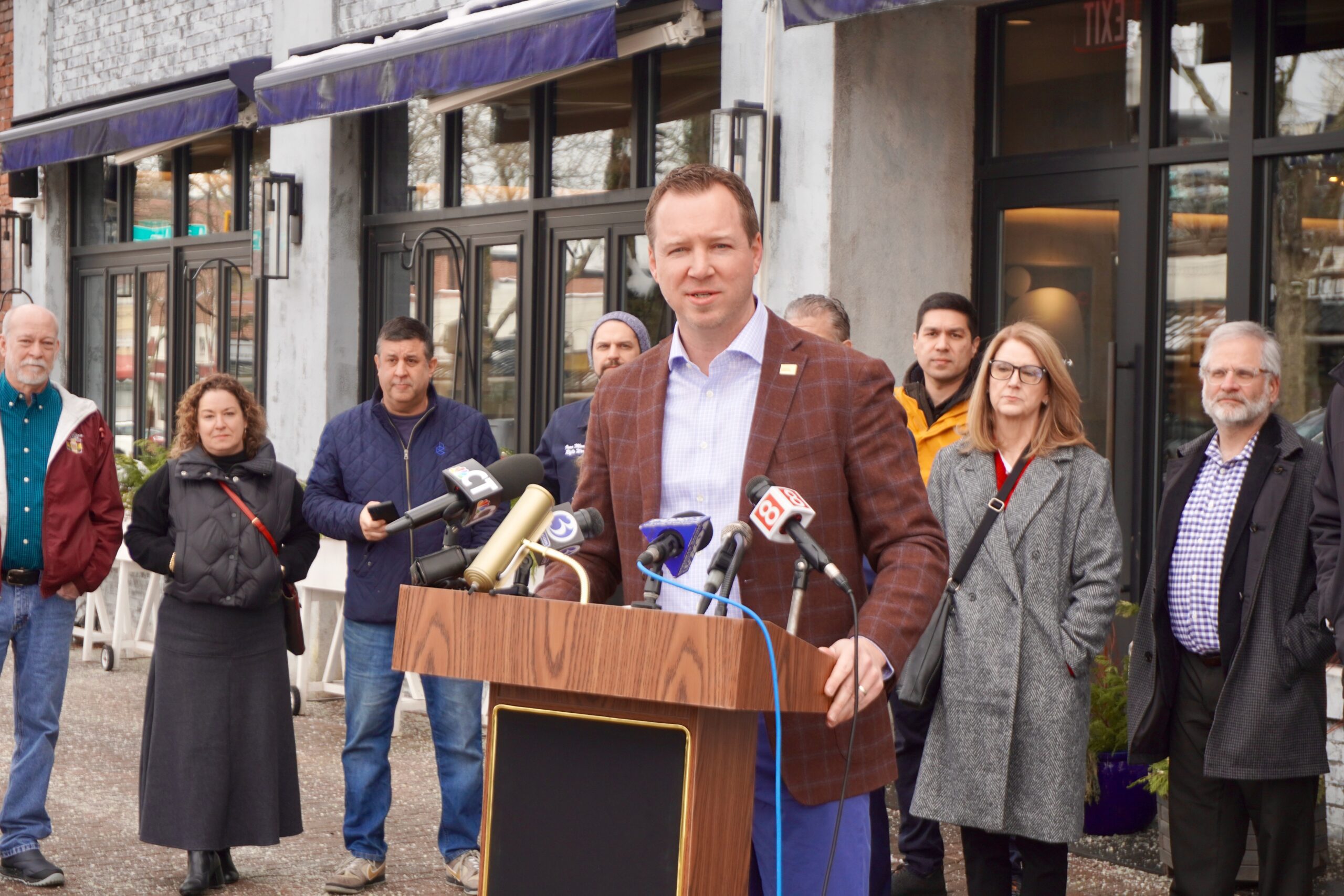
CT Restaurant Association President and CEO Scott Dolch is joined by local officials and restaurant owners at a press conference in West Hartford on Monday promoting the Connecticut Hospitality Fund. Photo credit: Ronni Newton
The Connecticut Restaurant Association brought together local officials and restaurant owners in West Hartford on Monday to promote creation of the ‘Connecticut Hospitality Fund’ from the state’s existing 1% meal and beverage tax.
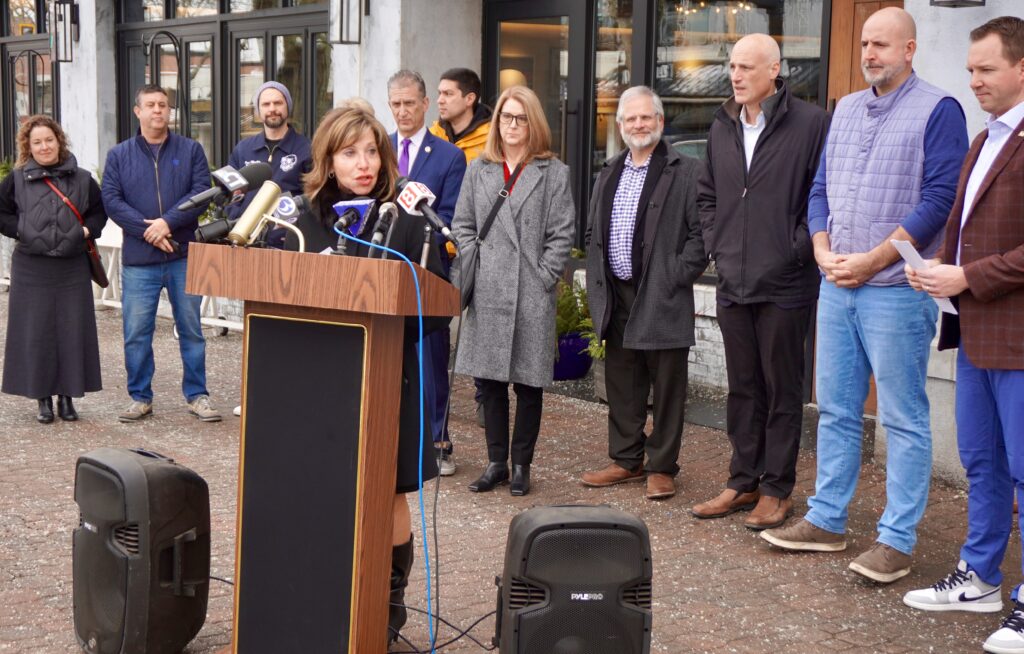
West Hartford Mayor speaks at a press conference in front of Zohara on Monday, Feb. 3, promoting the Connecticut Hospitality Fund. Photo credit: Ronni Newton
By Ronni Newton
The extra 1% tax that Connecticut already charges on meals and beverages could be used to create a fund that would directly invest in and support the hospitality industry and towns rather than just being added to the state’s General Fund if Senate Bill 739 is passed by the General Assembly.
With Zohara – one of DORO Restaurant Group’s many successful West Hartford Center restaurants – serving as a backdrop, Scott Dolch, president and CEO of the Connecticut Restaurant Association, was joined at a press conference on Monday afternoon by West Hartford Mayor Shari Cantor, state Sen. Derek Slap (D – West Hartford, Bloomfield, Burlington, Farmington), Wethersfield Mayor Ken Lesser, and local restaurant owners to promote the creation of the “Connecticut Hospitality Fund.” The measure calls for reinvesting the millions of dollars that the state is currently receiving through the extra tax charged statewide on meals and beverages in “into our cities and towns, into tourism, and obviously into workforce development for hospitality,” Dolch said.
In 2019, Connecticut’s meal and beverage tax was increased from 6.35% to 7.35%, and that extra 1% in taxes, which has generated more than $100 million a year, has gone straight to the state’s General Fund. While the revenue may have been needed at the time the tax was established, the state is now running surpluses and is in much better financial shape.
What’s being proposed is distribution of 50% of the Connecticut Hospitality Fund – estimated to be at least $45 to $50 million – directly to municipalities throughout the state based on where the meal and beverage tax was generated. Dolch told We-Ha.com that in West Hartford the total would be at least $1 million, and Cantor thought it could be as much as $1.4 million.
“The mayors, first selectmen I’ve talked to, they’ve done a phenomenal job supporting our restaurants through the last four or five years, through COVID. We want to help support them, make sure those dollars are going back into those cities and towns and reinvest it back into hospitality,” said Dolch.
The remaining 50% would be split, with 30% to support the Connecticut Tourism Office to help the state remain competitive with peer states, and 20% earmarked for hospitality-specific workforce training. “We feel that investment will continue to help us elevate not only our restaurants, [but also] our hotels, our caterers, our private event venues, continue to elevate the hospitality scene in Connecticut for years to come,” Dolch said. He said that 10% of the state’s workforce is employed in the hospitality industry.
“So using these dollars in this way, I think will make a significant impact not only on the Town of West Hartford, but our 169 towns across the state,” Dolch said Monday.
West Hartford’s restaurants draw people from throughout the region, Cantor said. “I’m honored to join you in support of the Connecticut Hospitality Fund, a smart, forward-thinking initiative that if passed into law will benefit not only our state but the Town of West Hartford and so many other communities throughout our state in very meaningful ways.”
Restaurants, cafes, and bars contribute to the culture and character of a community, and many people might not even realize that there is an extra 1% meal and beverage tax added to their bill.
“Initially established for revenue diversification, instead this tax goes directly into the General Fund of the State of Connecticut,” said Cantor, who also co-chairs the Connecticut Conference of Municipalities Tax and Finance Policy Committee. Since its establishment, the meal and beverage tax has added more than $500 million to the state’s revenue stream.
“West Hartford has become a true dining destination and our local hospitality sector is a vital part of what makes this community so special. Every day we welcome neighbors and visitors alike who come not only for a great meal, but to experience the vibrant energy of our town,” Cantor said. But that also requires investment in parking, maintenance, and public safety.
“By passing this law, we have the opportunity to ensure that the portion of sales of the meals and beverage tax collected in each town could be reinvested right back into the community where it was generated. This makes so much sense,” said Cantor, adding that it would bolster local economies and create a “self-fulfilling cycle of growth and economic vibrancy” locally and statewide.
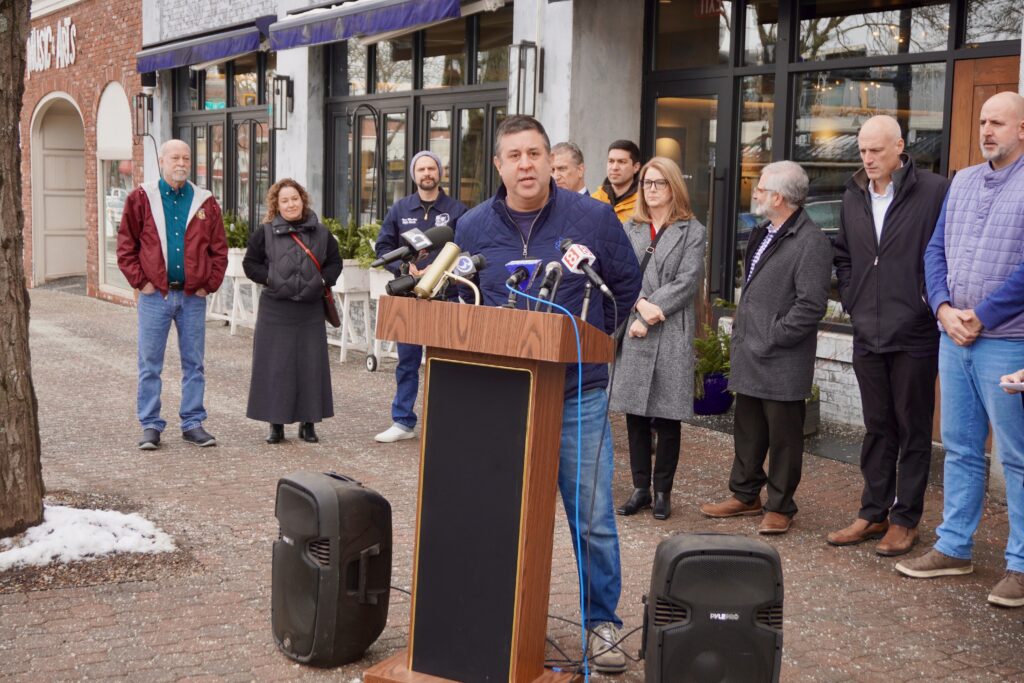
Scott Miller, COO and partner in DORO Restaurant Group, speaks at a press conference in front of Zohara on Monday, Feb. 3, promoting the Connecticut Hospitality Fund. Photo credit: Ronni Newton
Scott Miller, who is vice-chair of the CT Restaurant Association and COO and partner in DORO Restaurant Group, said that since Chef Dorjan Puka opened Treva in West Hartford Center about 15 years ago, DORO’s business has grown from 15 to about 600 employees. “Most of that is due to the relationships and the commitment of the Town of West Hartford and the support … through COVID we felt the love all day, every day,” he said, and they have now expanded with multiple restaurant concepts throughout the area, including Manchester, Newington, Wethersfield, and Windsor Locks.
“This meal tax, this 1% coming back to the municipalities obviously helps us, helps our sustainability, helps our employees,” said Miller, and could be used for improvements to parking, lighting, and more. “We need every town in the state of Connecticut to get their leadership behind this so that there is a future for our business.” The restaurant business is hard work, Miller said, and speaking on behalf of other restaurateurs, he added, “We love what we do, we continue what we do because our guests are important to us, but at the end of the day there are always going to be economic shifts and we need to be able to manage those.”
“Welcome to West Hartford, the restaurant capital of Connecticut,” said Slap on Monday, quickly adding that what’s being proposed is not just for West Hartford.
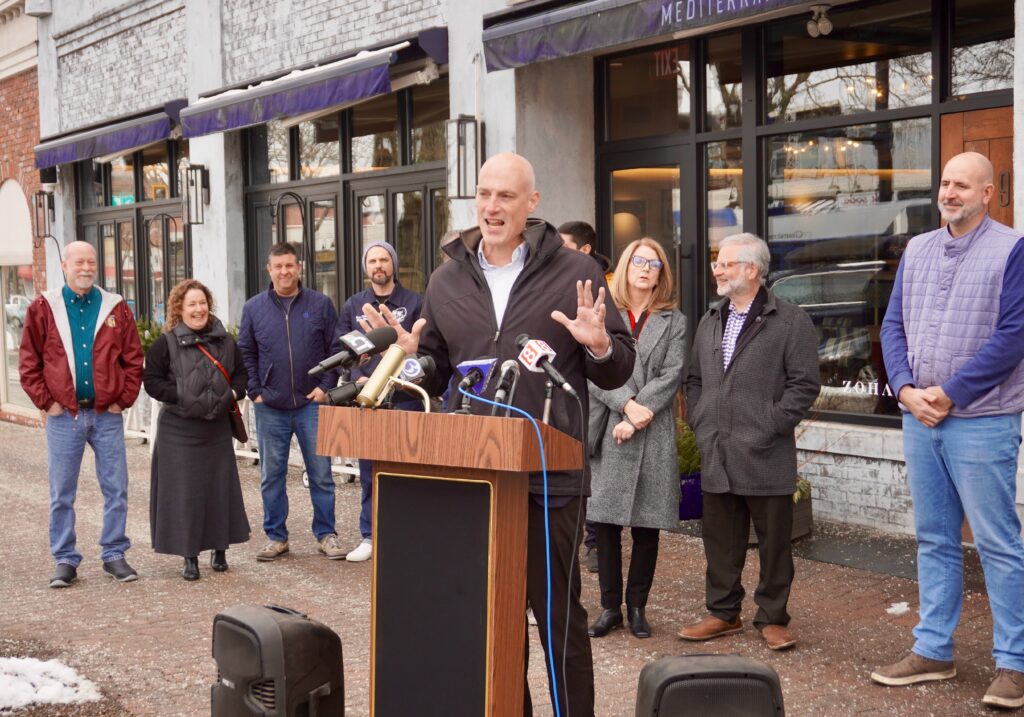
State Sen. Derek Slap speaks at a press conference in front of Zohara on Monday, Feb. 3, promoting the Connecticut Hospitality Fund. Photo credit: Ronni Newton
“This is not just a West Hartford bill. For anybody who wants to keep property taxes down as much as possible across the state, this is the bill for you. For anybody who cares about growing our economy, this is a bill for you. For anybody who cares about general affordability, this is a bill for you,” Slap said.
Slap, who introduced the bill with co-sponsors Sen. Martin Looney and Sen. Jorge Cabrera, said SB 739 will help all 169 municipalities in the state, and he is optimistic that it will get real traction. “This is a bill about helping on property taxes … about quality of life,” he said.
“Fundamentally, this bill for me is about fairness, basic fairness. The restaurants and the customers who generate the revenue in a particular place, a particular town, they should be able to keep some of that in the community,” said Slap, and the municipality should be able to determine the best use of that revenue to help with affordability and quality of life in that town.
“This is a bill that’s a win-win on so many fronts,” said Slap, noting that with Gov. Ned Lamont’s budget address planned for Wednesday, this is the time to introduce the bill.
Lesser added his support for the bill as well. “This money can really help communities. I know it also goes to workforce development and tourism, and it’s so important to reinvest that money, to grow our economy.”

Wethersfield Mayor Ken Lesser speaks at a press conference in front of Zohara on Monday, Feb. 3, promoting the Connecticut Hospitality Fund. Photo credit: Ronni Newton
Dolch said he has been speaking with the governor about the 1% tax for several years and is optimistic and hopeful it will be addressed during Wednesday’s budget address. The governor has been very supportive of the work of Connecticut’s Chief Marketing Officer Anthony Anthony and the tourism team. The state’s tourism budget has been dropping since American Rescue Plan Act (ARPA) funds are no longer available – from $12.1 million last year, to $7.5 million this year – and without further investment will drop to $4.5 million next year, he said. “With an industry that’s generating $1.2 billion in sales and use tax, I don’t like to see our tourism dollars continuing to be lower year after year, so we need to fund that,” said Dolch.
This is the time to create a permanent tool to support an industry that’s the backbone of local economies. “Reinvesting the meals and beverage tax back into the hospitality sector through the creation of this new fund will have a significant, positive impact on small businesses, job growth, and the generation of additional tax revenue. Most importantly, it will do it on an ongoing basis, continuing to create economic activity and state revenue into future years,” Dolch said.
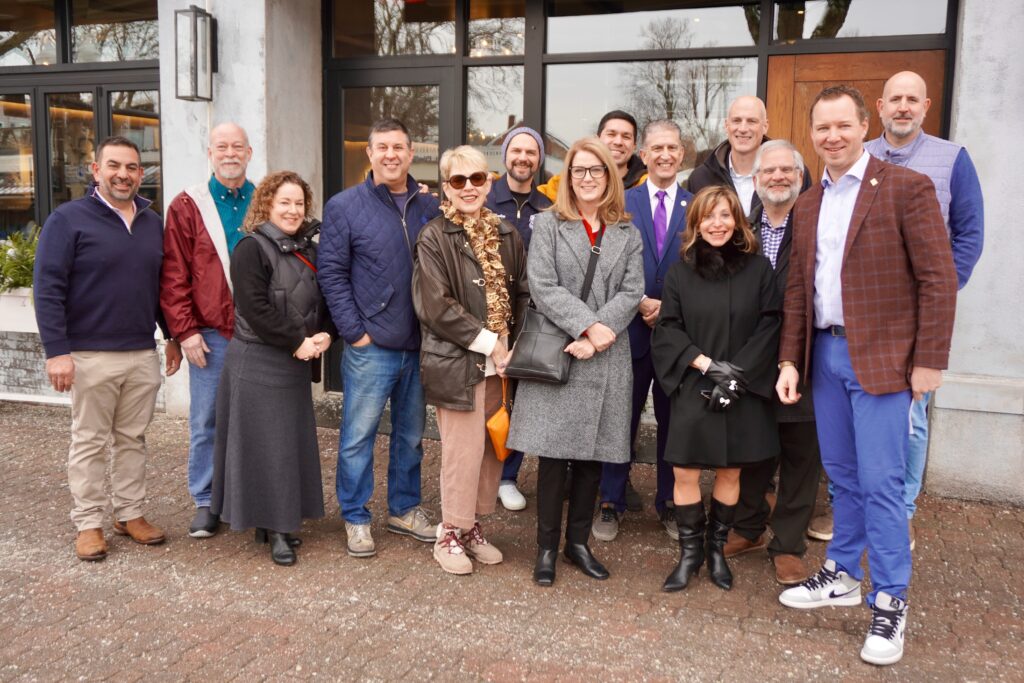
CT Restaurant Association President and CEO Scott Dolch (front right) is joined by local officials and restaurant owners at a press conference in West Hartford on Monday promoting the Connecticut Hospitality Fund. Photo credit: Ronni Newton
Like what you see here? Click here to subscribe to We-Ha’s newsletter so you’ll always be in the know about what’s happening in West Hartford! Click the blue button below to become a supporter of We-Ha.com and our efforts to continue producing quality journalism.




Insatiable desire for our money. You can bet even if the town where to get the funds, they wouldn’t fix the roads.